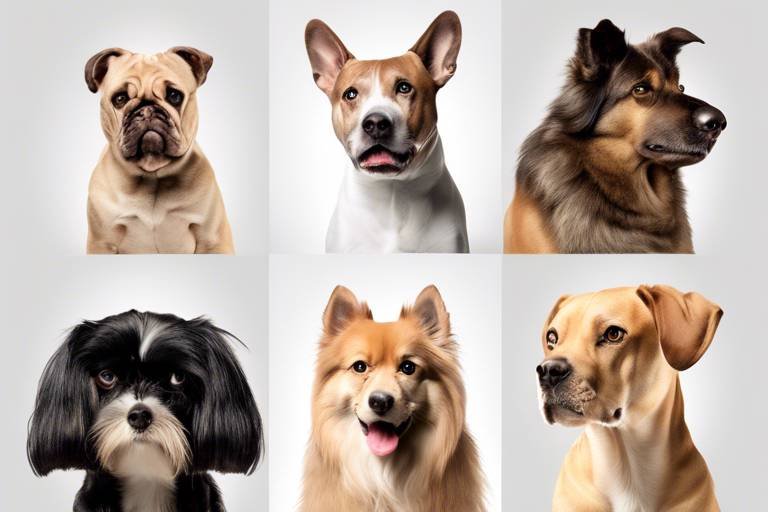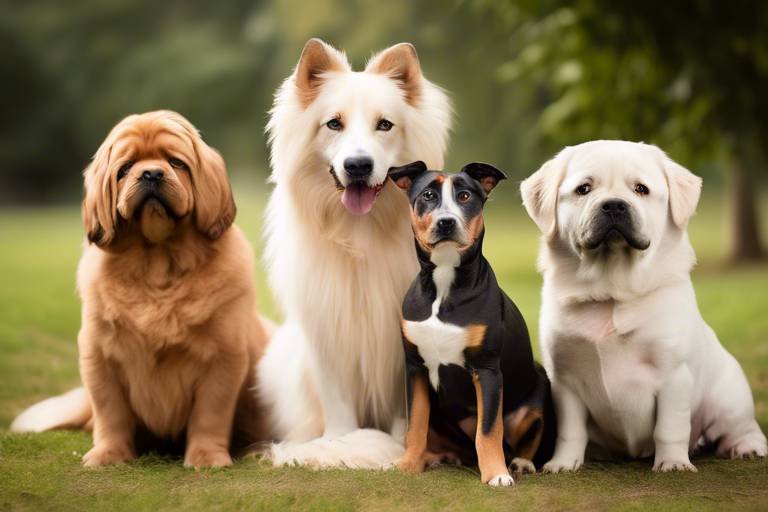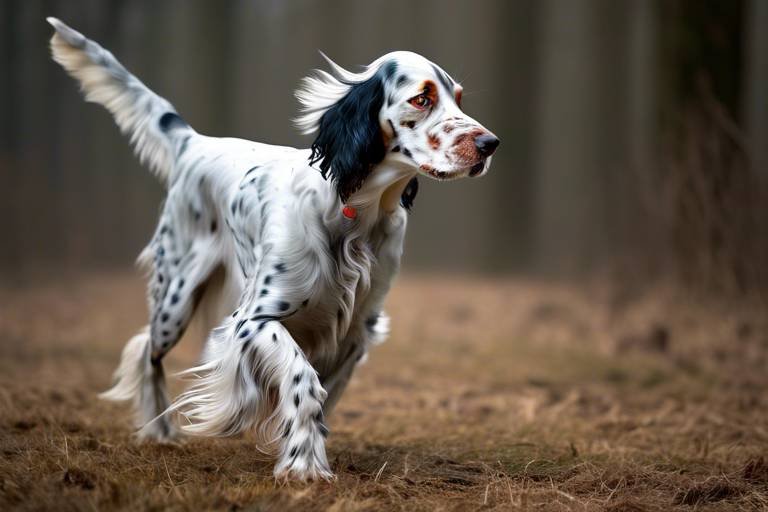The Affectionate Nature of Boston Terriers
Boston Terriers are often described as little bundles of joy wrapped in fur. Their affectionate nature makes them not just pets, but beloved family members. If you've ever had the pleasure of meeting a Boston Terrier, you know how they can instantly warm your heart with their playful antics and loving demeanor. This article explores the endearing characteristics that make Boston Terriers a favorite among dog lovers. From their friendly temperament to their unique ways of showing affection, Boston Terriers truly embody the essence of companionship.
One of the most striking features of Boston Terriers is their playful spirit. They are known for their energetic personality, which often translates into playful behaviors that can make anyone smile. Whether it’s a game of fetch or a simple tug-of-war, these dogs thrive on interaction. Their playful nature not only entertains but also strengthens the bond they share with their owners. Imagine coming home after a long day, only to be greeted by a Boston Terrier bouncing with excitement, ready to share in your joy. It’s moments like these that remind us why we love our furry friends so much.
In addition to their playful antics, Boston Terriers are incredibly affectionate. They have a knack for cuddling and seeking physical closeness with their human companions. This desire for connection is not just about warmth; it’s a profound expression of love and trust. Boston Terriers often snuggle up next to their owners on the couch or curl up in bed, making them the perfect cuddle buddies. Their gentle nature and soft, expressive eyes can melt away the stresses of the day, reminding us of the simple joys of companionship.
The temperament of Boston Terriers is one of the key reasons they are such cherished pets. They are generally known for being friendly, intelligent, and eager to please. This makes them highly trainable and adaptable, qualities that are essential for any family pet. Their sociable nature means they get along well with children and other pets, and they thrive in environments where they can be part of the family activities. It’s not uncommon for a Boston Terrier to follow their owner from room to room, wanting to be included in every moment.
Another aspect of their temperament is their affectionate disposition. Boston Terriers are known to form strong attachments to their families. They are not just passive companions; they actively seek out affection and interaction. This strong bond can lead to some delightful moments, such as when they greet you at the door with enthusiastic tail wags and playful barks. Their ability to express love and loyalty makes them not just pets, but true members of the family.
Q: Are Boston Terriers good with children?
A: Absolutely! Boston Terriers are known for their friendly and playful nature, making them great companions for children. They are gentle and enjoy playtime, which helps foster a loving relationship with kids.
Q: How much exercise do Boston Terriers need?
A: Boston Terriers have moderate exercise needs. Daily walks and playtime are usually sufficient to keep them happy and healthy. They enjoy short bursts of activity, so engaging them in play is beneficial.
Q: Do Boston Terriers shed a lot?
A: Boston Terriers have a short coat, which means they shed less compared to other breeds. Regular brushing can help minimize shedding and keep their coat healthy.
Q: Can Boston Terriers be left alone for long periods?
A: Boston Terriers thrive on companionship and may become anxious if left alone for extended periods. It’s best to ensure they have plenty of social interaction and mental stimulation.

Understanding Boston Terrier Temperament
Boston Terriers are a delightful breed, often referred to as "the American Gentleman" due to their charming appearance and amiable nature. These little bundles of joy are not just pets; they are family members that bring warmth and laughter into our lives. With their friendly and playful demeanor, Boston Terriers stand out as wonderful companions for both families and individuals. But what exactly makes their temperament so appealing?
At the heart of a Boston Terrier's personality is their affectionate nature. They thrive on human interaction and are known for their loyalty and devotion. Boston Terriers are typically very social creatures, which means they enjoy being around people and other pets. This sociability is rooted in their history as companion dogs, bred to be close to humans. Their playful antics can lighten up any room, and their tendency to seek out affection makes them endearing to everyone they meet.
One of the most remarkable aspects of Boston Terrier temperament is their ability to adapt to various living situations. Whether you live in a bustling city apartment or a spacious home in the suburbs, these dogs can adjust their energy levels accordingly. They are generally moderate in activity, which means they enjoy playtime but also appreciate a good cuddle session on the couch. This versatility makes them suitable for a wide range of households, from active families to laid-back individuals.
Additionally, Boston Terriers are known for their intelligence. They are quick learners and can pick up commands and tricks with ease. This intelligence, combined with their desire to please, makes training an enjoyable experience. However, it’s essential to approach training with a positive attitude, as harsh methods can lead to stress and anxiety in these sensitive pups. With the right training, Boston Terriers can learn to express their affection in ways that strengthen their bond with their owners.
In summary, understanding Boston Terrier temperament involves appreciating their affectionate, sociable, and adaptable nature. These dogs are not just companions; they are loving family members who bring joy into our lives. Their playful spirit, combined with their loyalty and intelligence, makes them a cherished addition to any home. So, if you're considering bringing a Boston Terrier into your life, be prepared for a whirlwind of love and laughter!

Affectionate Behaviors of Boston Terriers
When it comes to affectionate behaviors, Boston Terriers truly shine as some of the most loving companions you could ever hope for. These little bundles of joy are not just pets; they are full-fledged family members who express their love in delightful and often hilarious ways. Imagine coming home after a long day, and there they are, wagging their tails with uncontainable excitement, ready to shower you with affection. It's like having a little cheerleader at your feet, encouraging you to kick off your shoes and relax.
One of the most endearing traits of Boston Terriers is their innate ability to cuddle. These dogs have a knack for finding the coziest spot next to you, whether it's on the couch or snuggled up in bed. Their warm, soft bodies provide a sense of comfort that can melt away the stress of the day. It's almost as if they possess a magical power to make everything feel right in the world. This cuddling behavior is not just a one-way street; they crave physical touch and will often nuzzle against you, seeking closeness and warmth, which fosters a deeper emotional connection.
In addition to cuddling, Boston Terriers are known for their playful antics. They have a delightful way of turning even the simplest activities into a fun game. Whether it's chasing after a squeaky toy or engaging in a spirited game of tug-of-war, their playful nature brings a sense of joy that is infectious. This playful behavior not only strengthens the bond between the dog and owner but also creates countless cherished memories. Imagine laughing as your Boston Terrier performs a silly trick or rolls around in sheer delight—it’s moments like these that make life with a Boston Terrier truly special.
Moreover, Boston Terriers are incredibly social creatures. They thrive on interaction, not just with their owners but also with other pets. This social nature enhances their affectionate behaviors, as they learn to express their love and loyalty through play and companionship. When you bring a Boston Terrier into your home, you’re not just getting a pet; you’re gaining a lifelong friend who will always be there to share in your adventures, big or small.
But the affectionate behaviors of Boston Terriers don’t stop there. They have their unique ways of communicating love, which often includes a mix of vocalizations and body language. For instance, a gentle whine or a happy bark can signify their eagerness to be near you. Their expressive eyes can convey a world of emotions, from excitement to concern. Understanding these signals is key to nurturing the bond you share. It’s like learning a new language, one that deepens your connection with your furry friend.
In essence, the affectionate behaviors of Boston Terriers are what make them such beloved companions. Their cuddly nature, playful spirit, and social tendencies create a rich tapestry of love and joy that fills your home with warmth. Whether you’re enjoying quiet moments together or engaging in lively play, a Boston Terrier’s affection is a constant reminder of the joy that comes with having a loyal companion by your side.
- Do Boston Terriers require a lot of exercise? Yes, Boston Terriers are active dogs that enjoy regular playtime and walks to keep them healthy and happy.
- Are Boston Terriers good with children? Absolutely! Boston Terriers are known for their friendly and playful demeanor, making them great companions for kids.
- How can I encourage affectionate behavior in my Boston Terrier? Engaging in regular play, providing positive reinforcement, and spending quality time together can help foster affectionate behaviors.
- Do Boston Terriers get along with other pets? Generally, yes! They are social dogs and can coexist well with other animals if properly socialized.
Socialization and Bonding
Boston Terriers are not just pets; they are family members who thrive on social interaction and bonding with their humans. The importance of socialization in a Boston Terrier's life cannot be overstated. These little bundles of joy are known for their friendly nature, but without proper socialization, they may not fully develop the affectionate behaviors that make them such beloved companions. Imagine a child growing up without friends; similarly, a Boston Terrier that lacks social interaction may become shy or overly reserved.
To foster a strong bond with your Boston Terrier, it’s essential to expose them to various environments, people, and animals from a young age. This exposure helps them become well-adjusted and confident, which in turn enhances their affectionate nature. For instance, taking your Boston Terrier to dog parks or inviting friends over can be a game changer. They’ll learn how to communicate and interact positively with others, which builds their social skills and deepens their connection with you.
Moreover, bonding with your Boston Terrier goes beyond just socialization; it involves creating shared experiences. Engaging in activities together, such as playing fetch, going for walks, or even participating in dog training classes, can significantly enhance your relationship. These moments not only provide mental and physical stimulation for your dog but also create lasting memories that strengthen your emotional connection. Remember, the more time you invest in your Boston Terrier, the more affectionate they will become.
It’s also important to note that Boston Terriers are incredibly perceptive. They pick up on their owner’s emotions and behaviors, which means that your own attitude can influence their affectionate tendencies. If you approach interactions with positivity and enthusiasm, your Boston Terrier will likely mirror that energy, leading to a more affectionate and joyful relationship. Consistency in your interactions helps them feel secure and loved, which is crucial for their emotional well-being.
In summary, socialization and bonding are integral to the affectionate nature of Boston Terriers. By actively engaging in their social development and creating shared experiences, you cultivate a loving relationship that enriches both your lives. So, take the time to socialize your Boston Terrier, and watch as they blossom into the affectionate companion you’ve always wanted.
Playful Interactions
When it comes to Boston Terriers, their playful interactions are nothing short of a delightful spectacle. Imagine a small, energetic bundle of joy, bouncing around your living room, wagging its tail like it's just discovered a treasure chest of toys. These little dogs possess an innate ability to turn any mundane moment into a lively play session. Their playful antics not only entertain but also strengthen the bond between them and their owners.
One of the most charming aspects of a Boston Terrier's playful nature is their love for games. Whether it's a game of fetch, tug-of-war, or simply chasing after a squeaky toy, they bring a contagious enthusiasm that can brighten even the dullest day. Their playful spirit is often accompanied by an adorable play bow, where they lower their front legs while keeping their rear end up, inviting you to join in on the fun. This behavior is not just a call to play; it's a heartfelt invitation to share in their joy.
Moreover, Boston Terriers thrive on interaction, which makes playtime a crucial part of their daily routine. Engaging in play not only provides them with physical exercise but also stimulates their minds. A well-exercised Boston Terrier is a happy one, and their playful interactions are a testament to their affectionate nature. Here are some common ways you can enjoy playful moments with your Boston Terrier:
- Fetch: A classic game that never gets old. Toss a ball or a favorite toy, and watch your Boston Terrier dash after it with unbridled enthusiasm.
- Tug-of-War: Using a sturdy rope toy, engage in a friendly tug-of-war. This game not only provides physical exercise but also helps in building trust and teamwork.
- Hide and Seek: This game can be a fun way to stimulate their minds. Hide somewhere in your home and call your dog, rewarding them with praise when they find you.
These playful interactions are not just about burning off energy; they are a vital part of how Boston Terriers express their love and affection. Through play, they communicate their happiness and eagerness to be with their humans. As you engage in these activities, you'll notice how your Boston Terrier looks up at you with those big, expressive eyes, almost as if to say, "Isn't this the best time ever?"
Additionally, the laughter and joy that come from these playful moments create lasting memories. It's during these interactions that you’ll find yourself laughing at their goofy antics or marveling at their boundless energy. This shared joy fosters a deeper emotional connection, making your Boston Terrier not just a pet, but a true companion.
In conclusion, playful interactions are a fundamental part of a Boston Terrier's life. They are not merely games; they are expressions of love, trust, and companionship. So, the next time you grab a toy or head outside for a game, remember that you're not just playing—you're strengthening the bond that makes your relationship with your Boston Terrier so special.
- How much exercise does a Boston Terrier need? Boston Terriers typically require about 30 minutes of exercise each day, which can include walks and playtime.
- Are Boston Terriers good with children? Yes! Boston Terriers are known for their friendly and playful demeanor, making them great companions for families with children.
- What toys do Boston Terriers enjoy the most? They tend to love squeaky toys, balls, and tug toys, as these stimulate their playful nature.
Cuddling and Physical Affection
When it comes to cuddling and physical affection, Boston Terriers truly shine as some of the most loving companions you could ever hope for. These little bundles of joy have an innate desire to be close to their humans, often seeking out warmth and comfort in the form of snuggles. Imagine coming home after a long day, and there, waiting for you, is your Boston Terrier, tail wagging, ready to leap into your arms. It’s like being greeted by a tiny, furry superhero whose sole mission is to spread love and joy!
Boston Terriers are not just content with a casual pat on the head; they crave intimacy and connection. Whether it’s curling up on the couch during movie night or snuggling under the covers on a chilly morning, these dogs thrive on physical closeness. Their soft fur and warm bodies create an irresistible invitation for a cozy cuddle session. In fact, many Boston Terrier owners have found that these moments of physical affection can be incredibly soothing, not just for the dog, but for themselves as well. It’s a two-way street of love and comfort!
One of the most heartwarming aspects of Boston Terriers is their ability to sense when you need a little extra affection. If you're feeling down or stressed, your Boston Terrier will often nuzzle up to you, offering their warmth as a form of emotional support. This instinctive behavior speaks volumes about their empathetic nature. They seem to have a sixth sense for when their humans need a cuddle, making them not just pets, but true companions who understand your feelings.
Additionally, Boston Terriers have a unique way of expressing their affection through their body language. They often lean against you, rest their heads on your lap, or even roll over for a belly rub, all signs that they are seeking your attention and love. This kind of physical interaction not only strengthens the bond between you and your furry friend but also promotes a sense of security and trust. In fact, studies have shown that physical affection can release oxytocin, the "love hormone," in both dogs and humans, enhancing the emotional connection you share.
To sum it up, cuddling and physical affection are not just cute quirks of Boston Terriers; they are fundamental aspects of their personality. These affectionate behaviors create a nurturing environment that benefits both the dog and the owner. So, if you’re considering adding a Boston Terrier to your family, prepare yourself for a lifetime of cuddles, warmth, and unconditional love. After all, who wouldn’t want a furry friend whose favorite pastime is to snuggle up and share affection?
- Do Boston Terriers like to cuddle? Yes, Boston Terriers are known for their affectionate nature and love to cuddle with their owners.
- How can I encourage my Boston Terrier to be more affectionate? Spend quality time with them, engage in play, and provide positive reinforcement when they display affectionate behaviors.
- Are Boston Terriers good for families? Absolutely! Their friendly demeanor and affectionate nature make them great companions for families.
- What are some signs that my Boston Terrier loves me? Look for behaviors like following you around, leaning against you, and seeking physical closeness.
Expressing Affection Through Communication
When it comes to expressing affection, Boston Terriers have a unique flair that sets them apart from other breeds. These little bundles of joy are not just about wagging tails and playful barks; they have a whole repertoire of vocalizations and body language that communicate their love and attachment to their human companions. Imagine a tiny comedian, full of charm and charisma, ready to make you smile with every little gesture. That’s your Boston Terrier!
One of the most endearing ways Boston Terriers express their affection is through their vocalizations. They have a distinctive way of barking that can range from enthusiastic yips to soft whines, each sound carrying a different message. For instance, a high-pitched bark might signal excitement when you walk through the door, while a gentle whine can indicate that they want to cuddle or play. It’s like they have their own language, and you’re invited to be a part of it!
In addition to their vocal expressions, Boston Terriers are masters of body language. Their expressive eyes can tell you a lot about their feelings. When they look up at you with those big, soulful eyes, it’s as if they’re saying, “I love you, and I’m here for you.” They also use their bodies to communicate affection—leaning against you, nudging your hand with their nose, or even curling up in your lap are all signs that they want to be close and connected. It’s a form of non-verbal communication that speaks volumes about their loyalty and love.
Furthermore, Boston Terriers are known for their playful antics, which often serve as a means of expressing their affection. They may bring you their favorite toy or perform a silly trick, all to get your attention and share a moment of joy. This playful behavior not only strengthens the bond between you and your furry friend but also enhances their affectionate nature. It’s like they’re saying, “Let’s have fun together! You make me happy, and I want to make you smile too!”
To summarize, Boston Terriers communicate their affection in a variety of ways, including:
- Vocalizations: Unique barks and whines that convey different emotions.
- Body Language: Leaning, nudging, and cuddling are all signs of affection.
- Playfulness: Engaging in playful behavior to connect and share joy.
Understanding these forms of communication can significantly enhance your relationship with your Boston Terrier. By paying attention to their vocal cues and body language, you can respond to their needs and emotions more effectively, creating a deeper bond filled with love and trust. So, the next time your Boston Terrier gives you that adoring look or brings you a toy, remember that they are expressing their affection in their own special way.

Training for Affectionate Behavior
Training your Boston Terrier is not just about teaching them commands; it's also about nurturing their affectionate nature. These little bundles of joy thrive on interaction and love, and training can enhance their natural tendencies to show affection. By engaging in consistent and positive training methods, you can cultivate a deeper bond with your furry friend, allowing them to express their love more openly. Imagine your Boston Terrier, tail wagging and eyes sparkling, as they learn to respond to your cues with enthusiasm. It’s a heartwarming sight that reinforces the connection you share.
One of the most effective methods for encouraging affectionate behavior is through positive reinforcement. This technique involves rewarding your Boston Terrier with treats, praise, or playtime whenever they display affectionate actions, like cuddling or giving kisses. For instance, if your pup jumps up to greet you with excitement, shower them with affection and a tasty treat. This not only reinforces the behavior but also communicates that their affectionate gestures are valued. Over time, they will associate these loving actions with positive outcomes, making them more likely to repeat them.
Additionally, incorporating social skills development into your training routine can significantly enhance their affectionate nature. Boston Terriers are social animals, and exposing them to various environments, people, and other pets can help them learn how to express their love appropriately. For example, taking your dog to the local dog park can be a fantastic way to encourage friendly interactions. When they engage positively with other dogs or people, reward them with praise or treats. This not only boosts their confidence but also fosters a sense of community, which is essential for their emotional well-being.
Moreover, consistency is key in training. Establishing a routine helps your Boston Terrier understand what is expected of them, which can reduce anxiety and increase their willingness to express affection. Whether it’s designated cuddle time on the couch or a daily play session, creating predictable moments of bonding can make your dog feel secure and loved. This sense of security encourages them to be more affectionate, knowing that their needs for attention and love will be met.
Lastly, remember that training should always be a fun and engaging experience for both you and your Boston Terrier. Incorporating games that involve affection—like fetch with a twist where you reward them with cuddles after they retrieve the toy—can make the training process enjoyable. This way, your pup learns that showing affection leads to more playtime and love, deepening the bond between you two.
- How long does it take to train my Boston Terrier to be more affectionate?
Training can vary based on the individual dog's personality and your consistency. However, with regular practice, you may start seeing changes in their affectionate behavior within a few weeks. - Can I train my Boston Terrier to be affectionate with other pets?
Yes! Socialization is crucial. Gradually introduce them to other pets in a controlled environment, rewarding positive interactions to encourage affectionate behavior. - What if my Boston Terrier is naturally less affectionate?
Every dog has a unique personality. Focus on building trust and providing positive experiences to encourage affectionate behavior, even if it takes longer.
Positive Reinforcement Techniques
When it comes to nurturing the affectionate nature of Boston Terriers, are your best friends. Imagine this: you’re trying to teach your furry companion to sit, and instead of scolding them when they don’t get it right, you shower them with love and treats when they do. This method not only makes training a fun experience for your Boston Terrier but also strengthens the bond between you two. It’s like building a bridge of trust where each treat and praise is a brick that fortifies your relationship.
One of the most effective ways to implement positive reinforcement is through the use of verbal praise and treat rewards. For instance, every time your Boston Terrier successfully follows a command, you can say “Good boy!” or “Well done!” in an enthusiastic tone. This vocal encouragement can be just as rewarding as a tasty treat. In fact, many dogs thrive on verbal affirmation, making it a crucial part of their training routine.
It’s essential to remember that timing is everything when using positive reinforcement. As soon as your Boston Terrier performs the desired behavior, you should reward them immediately. This instant gratification helps them associate the action with the reward. For example, if your pup sits on command, give them a treat right away. This practice not only reinforces the behavior but also keeps them eager to learn more.
To illustrate the effectiveness of positive reinforcement, let’s take a look at a simple training table:
| Behavior | Positive Reinforcement |
|---|---|
| Sit | Treat and verbal praise |
| Stay | Affection and a favorite toy |
| Come | Playtime and treats |
In addition to treats and praise, incorporating playtime as a form of reward can be particularly effective. Boston Terriers have a playful spirit, and using their favorite toys as a reward can motivate them to engage in desired behaviors. For example, if they come when called, you could reward them with a game of fetch. This not only reinforces the behavior but also allows them to express their playful nature, making training a delightful experience for both of you.
Moreover, consistency is key. Establishing a routine where positive reinforcement is used regularly will help your Boston Terrier understand what behaviors are expected of them. You might find it helpful to keep a training journal where you can track their progress and note which rewards are most effective. This approach will help you tailor your training to your pup’s unique personality, ensuring that you’re using the most motivating rewards.
In summary, positive reinforcement techniques are a powerful way to cultivate affectionate behaviors in Boston Terriers. By rewarding them with treats, praise, and playtime, you’ll not only teach them commands but also deepen the emotional connection you share. Remember, training should be a joyful journey, and with the right techniques, it can be a rewarding experience for both you and your furry friend!
- What is positive reinforcement? Positive reinforcement is a training method that rewards desired behaviors to encourage their repetition.
- How do I know what rewards to use? Observe your Boston Terrier's preferences; some may respond better to treats, while others may prefer toys or verbal praise.
- Can positive reinforcement help with behavioral issues? Yes, it can be an effective way to redirect unwanted behaviors by rewarding good behavior instead.
- How often should I train my Boston Terrier? Short, frequent training sessions are more effective than long, infrequent ones. Aim for 5-10 minutes daily.
Social Skills Development
When it comes to Boston Terriers, developing social skills is not just a luxury; it’s a necessity. These charming little dogs thrive on interaction, not only with their human companions but also with other pets. Socialization is crucial for fostering their affectionate nature, and it significantly enhances their overall temperament. Imagine a Boston Terrier as a social butterfly, flitting from one friend to another, eager to share their love and joy. But how do we cultivate this social prowess in them? Let's explore the key aspects.
First and foremost, early exposure to various environments, people, and other animals is essential. The more experiences they have during their formative months, the more confident and well-adjusted they will become. Think of it like a child learning to navigate the world—each interaction is a building block for their social skills. Regular visits to parks, pet-friendly stores, and even doggy daycare can provide invaluable opportunities for your Boston Terrier to meet and greet others.
Additionally, structured playdates can be incredibly beneficial. Engaging with other dogs in a controlled setting allows your Boston Terrier to learn important cues about dog behavior and body language. This not only helps them understand their peers better but also teaches them how to express their own feelings of affection and excitement. Just like humans, dogs learn a lot through play, and it’s during these interactions that they often develop lifelong friendships.
Another vital aspect of social skills development is positive reinforcement. When your Boston Terrier interacts well with others, rewarding them with treats or praise can reinforce that behavior. This creates a positive association with social interactions. For instance, if they approach another dog politely, you can reward them immediately. Over time, they will learn that being friendly brings about good things. It’s all about creating a positive feedback loop that encourages your Boston Terrier to continue being affectionate and sociable.
Moreover, attending training classes can significantly improve their social skills. These classes often provide a safe environment for your Boston Terrier to learn commands while interacting with other dogs and humans. It’s an excellent way to expose them to different situations while ensuring they receive guidance and support. Think of it as a classroom where they learn not just the ABCs but also the art of being a good friend!
Lastly, it’s important to remember that every Boston Terrier is unique. Some may take longer to warm up to new friends than others. Patience and understanding are key. Celebrate small victories along the way, and don’t hesitate to seek help from a professional trainer if needed. With consistent effort and love, your Boston Terrier will blossom into a social, affectionate companion who knows how to navigate the world with charm and grace.
- How can I tell if my Boston Terrier is well-socialized? If your dog is comfortable around various people, pets, and environments without showing signs of fear or aggression, they are likely well-socialized.
- What age should I start socializing my Boston Terrier? Ideally, socialization should begin as early as 8 weeks of age, but it’s never too late to start!
- How do I handle my Boston Terrier’s fear of new situations? Gradual exposure and positive reinforcement can help them feel more secure. Take it slow and reward them for brave behavior.
Frequently Asked Questions
- What makes Boston Terriers so affectionate?
Boston Terriers are naturally friendly and social dogs. Their affectionate nature stems from their strong desire to bond with their owners. They thrive on companionship and often seek physical closeness, making them perfect cuddle buddies!
- How can I encourage my Boston Terrier to be more affectionate?
Encouraging affection in your Boston Terrier can be achieved through positive reinforcement. Reward them with treats and praise when they display affectionate behaviors. Regular playtime and cuddling sessions also help strengthen your bond.
- Are Boston Terriers good with children?
Absolutely! Boston Terriers are known for their gentle and playful demeanor, making them great companions for kids. Their affectionate nature means they often enjoy being around children, playing games, and cuddling.
- Do Boston Terriers require a lot of socialization?
Yes, socialization is crucial for Boston Terriers. It helps them develop their affectionate nature and ensures they are well-adjusted. Regular interactions with other pets and people can enhance their social skills and overall temperament.
- What are some common signs of affection in Boston Terriers?
Boston Terriers express affection in various ways, including cuddling, licking, and following you around. They may also display their love through playful antics and by leaning against you when they want attention.
- Can training improve my Boston Terrier's affectionate behavior?
Definitely! Training, especially using positive reinforcement techniques, can enhance your Boston Terrier's affectionate behaviors. Teaching them commands and rewarding them for good behavior fosters a loving and loyal relationship.
- How much exercise do Boston Terriers need to maintain their affectionate nature?
Boston Terriers need moderate exercise to stay healthy and happy. Regular walks and playtime not only keep them fit but also help channel their energy positively, enhancing their affectionate interactions with you.



















